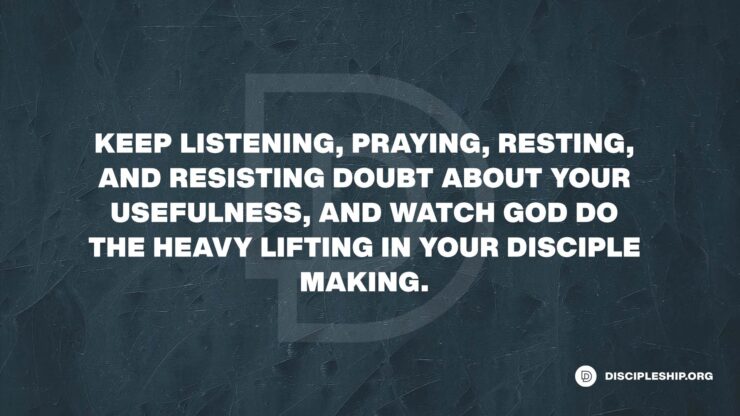(You’re Not) Following in Jesus’ Footsteps

Jesus called people to follow Him. Not believe in Him. Follow Him.
You’ve been told that “you should follow in his steps.” (1 Peter 2:21)
Right now, your head is nodding. Of course. You’re wondering if you should even continue reading this, because you already know it and agree with it.
But do you really?
It’s easy to agree theoretically with following in Jesus’ footsteps. The problem comes when we examine the gospels and ask the question: Where did Jesus’ feet regularly go? When we do, it becomes obvious Jesus regularly walked to four places. If we’re not going to those four places, we’re not truly following in Jesus’ footsteps.
To Secluded Places, with the Father
Jesus was regularly pulling away from the crowds, from his disciples, from doing ministry and walking to secluded places where He could be alone with the Father.
In Mark 1, we see Jesus in the wilderness spending forty days alone with the Father. He is launching His ministry, and He does so by spending the first forty days fasting and praying. He then comes back to society, where He has a very busy day of ministry. So, forty days alone with God, one day filled with serving people. What does he do next?
Very early in the morning, while it was still dark, Jesus got up, left the house and went off to a solitary place, where he prayed. (Mark 1:35)
To be clear, after forty secluded days with the Father, Jesus does one day of ministry, and then immediately retreats again to a solitary place so He could pray.
Does that sound like the pattern of your life? If people who knew you wrote books about your life, would they remark on the priority you placed on going to solitary places to grow in intimacy with the Father?
If we’re not regularly going to secluded places to be with the Father, we are not following in Jesus’ footsteps.
To the Lost and Broken
Jesus regularly went to the spiritually lost and the desperately broken.
We see Jesus eating with tax collectors and sinners, much to the religious leaders’ dismay. When questioned about it, Jesus responds, “It is not the healthy who need a doctor, but the sick. I have not come to call the righteous, but sinners.” (Mark 2:17)
He stops to talk with a Samaritan woman at a well—breaking cultural, religious, and gender barriers. He touches lepers when everyone else recoils. He welcomes prostitutes and allows them to wash His feet with their tears. He delivers demon-possessed men living in tombs when everyone else had given up on them.
Why? Because that’s precisely why He came. “For the Son of Man came to seek and to save the lost.” (Luke 19:10) That’s what God sent Him to do, and Jesus passed on that mission to us: “As the Father has sent me, I am now sending you.” (John 20:21)
So, what about you? When was the last time you intentionally spent time with someone far from God? When did you last have a meal with someone society considers “unclean”?
Most Christians spend their time with people who look, think, and believe just like them.
Is that you? I’ve heard it said: If you’re not close to people who are far from God, you may not be as close to God as you think you are. Because God’s heart is always with those who are far from Him.
If we’re not regularly going to the lost and broken, we are not following in Jesus’ footsteps.
To Make Disciples
Jesus regularly and intentionally pulled away from the crowds so He could relationally pour His life into a few people. He prioritized disciple making.
Thousands of people followed Jesus, but He chose twelve. (Mark 3:13-14) Even within the twelve, He had an inner circle of three, who He brought with Him so they could watch Him do life with God and minister to others. (See, for example, Mark 5:47-53 and Mark 9:2-8).
More than He did with the masses, with the twelve, and especially the three, Jesus… taught them, corrected them, encouraged them, and modeled for them what it meant to live for God. With everyone else, He preached sermons. With them, He shared His life. They watched Him pray. They saw how He handled conflict. They observed His compassion for the hurting.
Why? Because Jesus knew that transformed people transform people. His strategy was not to reach the masses directly—it was to multiply Himself by deeply investing in a few, through whom He would reach the masses.
Be honest: Are you intentionally pouring your life into others? Do you have a few people you’re sharing your entire life with so you can help them grow spiritually?
If we’re not regularly making disciples, we are not following in Jesus’ footsteps.
To the Cross of Sacrifice
Ultimately, Jesus’ footsteps took Him to the cross, where He sacrificed His life for our lives, His desire for our desires, His will for His Father’s will.
In the Garden of Gethsemane, we see Jesus wrestling with what lay ahead. “My Father, if it is possible, may this cup be taken from me. Yet not as I will, but as you will.” (Matthew 26:39) He had the choice, and He chose the Father’s will, the cross, over His own comfort and desires.
Throughout His ministry, we see this pattern. He sets aside time alone with the Father to minister to needy crowds. He gives up sleep to pray. He sacrifices popularity by speaking hard truths. He surrenders His reputation by associating with sinners.
Why? Because love always costs something. Real love requires sacrifice. Jesus said, “Greater love has no one than this: to lay down one’s life for one’s friends.” (John 15:13)
Jesus didn’t just choose the cross; He demanded we do so as well.
“Then Jesus said to his disciples, ‘Whoever wants to be my disciple must deny themselves and take up their cross and follow me. For whoever wants to save their life will lose it, but whoever loses their life for me will find it.’” (Matthew 16:24-25)
Take an honest look at your life. What are you sacrificing for others? What comforts are you willing to give up? What costs are you willing to bear? Or… is your faith carefully constructed to never interfere with your preferences and plans?
If we’re not regularly sacrificing for others, we are not following in Jesus’ footsteps.
The Choice Before Us
Jesus’ feet regularly walked to secluded places with the Father, to the lost and broken, to make disciples, and to the cross of sacrifice.
If we claim to follow Jesus but our feet aren’t regularly going to these same places, we’re not really following Him. We’re just fans who admire Him from a distance.
The question isn’t whether you believe in Jesus. The question is: Where are your feet taking you?
Will you actually follow in His footsteps? Or will you continue nodding in agreement but never moving your feet?
The path He walked isn’t easy, but it’s the only path that honors Him and leads to life.
So, where will your feet take you today?
If you have enjoyed reading this, please consider joining our email list!










